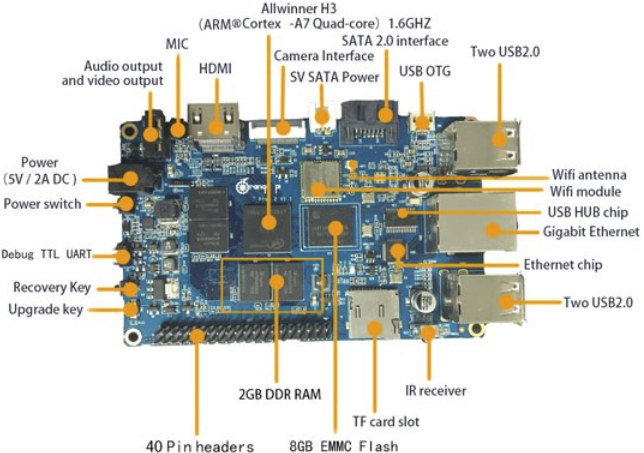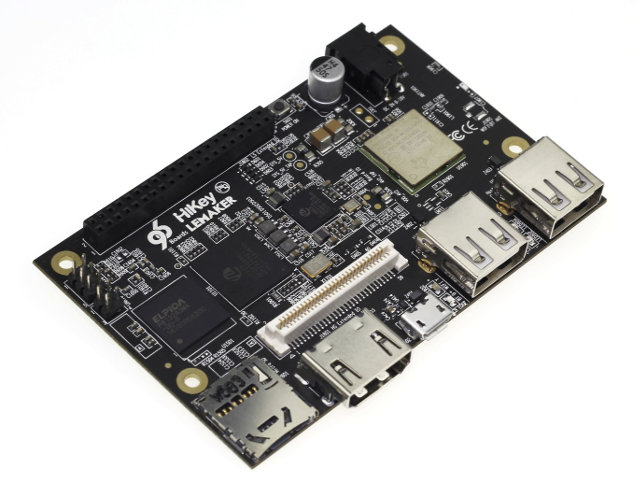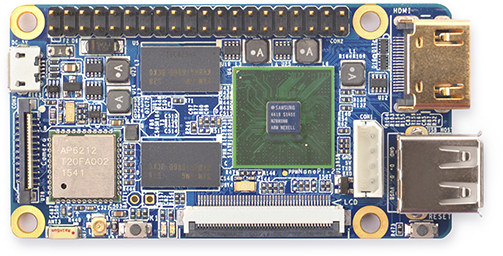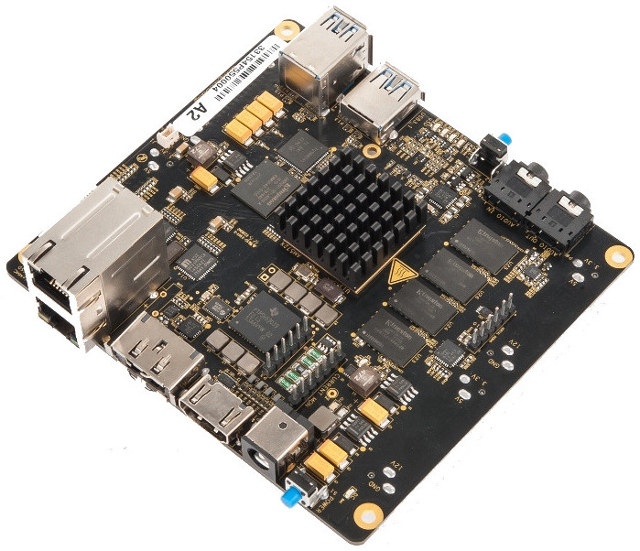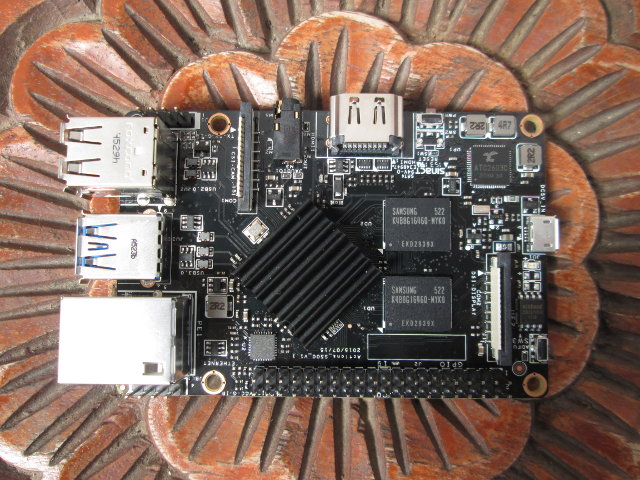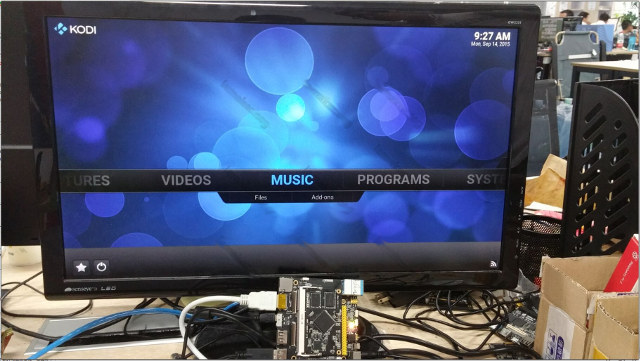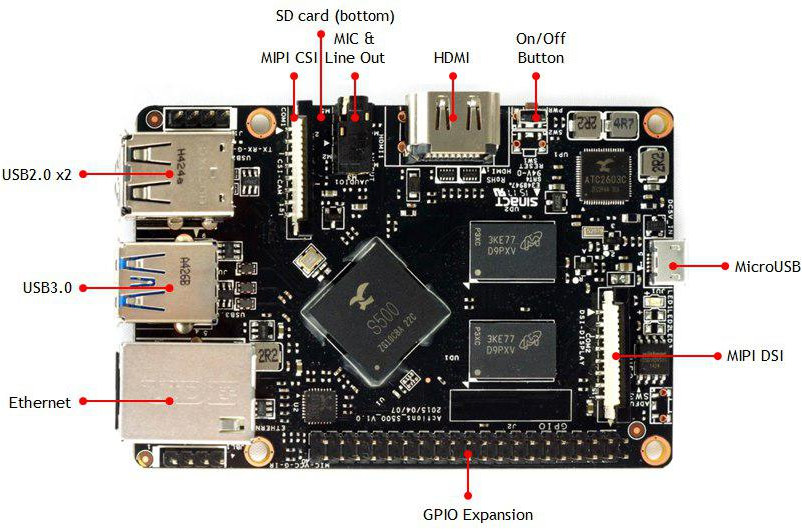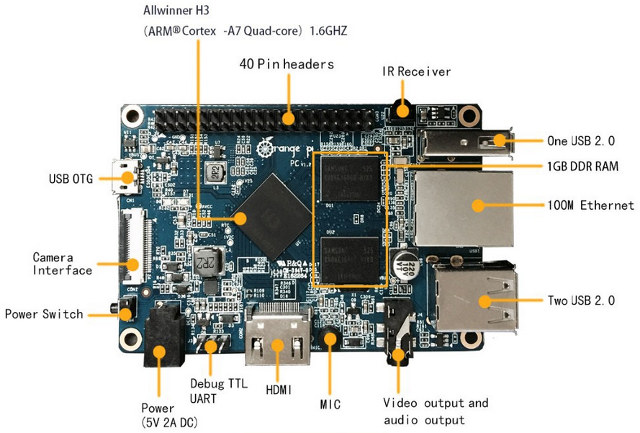Shenzhen Xunlong has made yet another Allwinner H3 board. It’s called Orange Pi Plus 2 with basically the same specifications as Orange Pi Plus, but the layout has been modified with a slightly wider board, and the RAM upgraded from 1GB to 2GB. Orange Pi Plus 2 specifications: SoC – Allwinner H3 quad core Cortex A7 @ 1.2 GHz with ARM Mali-400MP2 GPU up to 600 MHz System Memory – 2GB DDR3 Storage – 8GB eMMC, micro SD card slot, SATA interface (via a USB to SATA chip), Video Output – HDMI, AV port Audio I/O – HDMI, AV port, on-board microphone Connectivity – 10/100/1000M Ethernet, 802.11 b/g/n Wi-Fi (Realtek RTL8189ETV) USB – 4x USB 2.0 host ports, 1x micro USB OTG port Camera – CSI Interface Expansions – 40-pin Raspberry Pi Model A+/B+ (mostly) compatible header Debugging – 3-pin UART header for serial console Misc – IR receiver; Power, […]
Linaro Releases the First (Alpha) Version of the 96Boards Reference Software Platform
Linaro’s 96Boards initiative was launched at the beginning of the year with Hikey board, and beside the hardware specifications, 96Boards also has some software requirements that include support for “bootloader (open source), accelerated graphics support (binary or open source), a Linux kernel buildable from source code based from mainline, or the latest Google-supported Android kernel version, or the last two LTS kernels, and one of more of the following operating systems: Android, Debian/Ubuntu, Fedora/Red Hat, or an OpenEmbedded/Yocto build of a Linux distribution”. In order to achieve this goal, Linaro introduced the Reference Software Platform for 96Boards, and they’ve now pushed the first Alpha release for Hikey and DragonBoard 410c boards. The release includes a bootloader, the Linux kernel, Debian and AOSP with firmware, source code, and documentation. Some highlights of the Reference Software Platform 15.10 Alpha release include: CE Debian RPB (Reference Platform Build) Debian 8.2 “Jessie” Linux 4.3 […]
NanoPi2 is a Tiny Board with Samsung S5P4418 Processor, WiFi and Bluetooth Connectivity
FriendlyARM released NanoPi board this summer, a small and inexpensive development board based on Samsung S3C2451 ARM9 processor with both WiFi and Bluetooth connectivity. The company has now unveils a more powerful, and slightly wider, version with NanoPi2 featuring Samsung S5P4418 quad core Cortex A9 processor with 1GB RAM, AP6212 wireless module, a new HDMI output, and the same connectors for I/Os and LCD displays. NanoPi2 specifications: SoC – Samsung S5P4418 quad core Cortex A9 processor @ up to 1.4GHz System Memory – 1GB 32bit DDR3 Storage – 2 x Micro SD Slot Connectivity – 802.11 b/g/n WiFi and Bluetooth LE 4.0 via AP6212 module Video Output / Display I/F- 1x HDMI 1.4a, 0.5 mm pitch SMT FPC seat for type-A full-color LCD (RGB: 8-8-8) Camera – 24-pin DVP interface USB – 1x USB Host port; 1x micro USB 2.0 OTG port for power and data Expansions Headers – 40-pin […]
BeagleBoard-X15 Board Based on TI Sitara AM5728 SoC Announced, To Sell for $239
We’ve first found out about Beagleboard-X15 open source hardware board about a year ago, and development has taken a bit longer than expected, but Beagleboard.org has now formally launched BeagleBoard-X15, which remains based on Texas Instruments Sitara AM5728 dual Cortex A15 processor, and is expected to ship before Christmas for $239. The key part of the specifications are still the same as last year, but we’ve got a few more details now: SoC – Texas Instruments Sitara AM5728 with: Two ARM Cortex A15 cores @ 1.5 GHz PowerVR SGX544-MP2 3D GPU, Vivante GC320 2D GPU Two Cortex M4 cores @ 212 MHz Dual core C66x DSP @ 700 MHz IVA (Image and Video Accelerator) for 1080p video decode (H.264, VC-1, MPEG 1/2/4, AVS, etc..) Four 32-bit PRUs (Programmable Real-time Units) System Memory – 2GB DDR3L @ 533MHz Storage – 4GB 8-bit eMMC flash, micro SD slot, and eSATA interface (500 […]
Linux Quick Start Guide for Roseapple Pi Board based on Actions Semi S500 Processor
Roseapple Pi is a development board powered by Actions Semi S500 processor with 2GB RAM, a USB 3.0 port and more, that is based on Actions Semi Bubblegum-S500 reference design also used by Lemon Pi board. The team behind the project sent me an early sample to try it out. I’ll take some pictures, before explaining how to install and setup Debian 8.1, and how to build and run your own minimal image from source. These instructions should also work for Lemon Pi and LeMaker Guitar boards. Roseapple Pi Photos I received the board in a bubble envelope with a thank you letter, and the board itself in an anti-static bag. No other accessories were provided. Ports, connectors, and headers from top left counter-clockwise: 4-pin UART console, two USB 2.0 ports, one USB 3.0 port, 10/100 Ethernet, a 40-pin Raspberry Pi comptabile header, a MIPI DSI connected, a micro USB […]
LeMedia is a Linux Distribution based on Debian and Kodi 15.2 for Actions Semi S500 Processor
LeMaker has recently released LeMedia, a Linux distribution based on Kodi 15.2 and Debian Jessie for their Guitar board powered by Actions Semi S500 quad core Cortex A9 processor, also found in Lemon Pi, ActDuino-S500 and Roseapple Pi boards. The good news is that H.264 and MPEG4 hardware video decoding is implemented, as well as PowerVR SGX544 GPU 3D acceleration. This is an early version and while IR receiver, WiFi, HDMI and LCD output, and audio are working, the company explained that HDMI support may be flaky, USB 3.0 speed is not optimal, and touchscreen support had to be disabled. They also included a “LeMedia Settings” in the image to have a similar experience as “RaspBMC Settings”. The images for booting from SD card or eMMC can be downloaded here. It’s quite likely they only work on LeMaker Guitar board, and I could not find the Linux 3.10.37 kernel, nor […]
Roseapple Pi Board Powered by Actions Semi S500 Comes with 2GB RAM
[Update: I’ve finally received an answer: Lemon Pi and RoseapplePi makers are different companies, but they just happen to both use the same Actions Semi S500 reference design, and RoseapplePi is manufactured in Taiwan. The picture above is V1.0 board, but V1.1 will have some modifications] Lemon Pi development board was launched this May via a Indiegogo campaign. The board, based Actions Semi S500 quad core Cortex A9 processor, got fully funded by over 200 backers, but at the time of launch, some people questioned the used of the word “Lemon” in a product name, as it has several pejorative meanings, including “something that is useless or crappy”. I was contacted about a new Roseapple Pi board yesterday, and upon checking out the details, it looks exactly like the Lemon Pi, except it got upgraded to 2GB RAM, just like in Indiegogo… The board name on the PCB also reads […]
Orange Pi PC Not Booting? You Are Not Alone…
Orange Pi PC development board launched at the end of August, and quickly went viral thanks to low $15 price tag. The company, Shenzhen Xunlong Software, is fairly small, with just over 10 employees, so when they started getting several thousands customers in a short time, they may have been overwhelmed, and this likely resulted in delays with regards to shipping, and acceptance into Orange Pi forums. Several people have now received their boards, and while many found it to work fine, I’ve been informed several people apparently got a non booting device. People on Youtube and Orange Pi Forums also complained about a booting issue until Ethernet lights up, or Ethernet not working, while other reports Linux is working, but not Android. Unless there was a bad batch during manufacturing, it’s hopefully mostly a firmware issue. The person who reports Ethernet not working, first used the images from Orange […]


